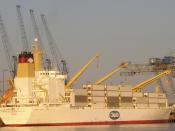Chiquita
1Who or what to blame for Chiquita's financial difficulties?
The main reason for Chiquita's financial problems was the inappropriate management. The manager did not understand the situation in the international market in 1993 well and was not ready to change the company's international strategy regarding new quotas from EU, as it did other bananas exporter companies.
As Chiquita was greatly dependent on European market, the main priority for it should have been the good relationship with EU authorities. Also the manager could feel the situation and change the place of raising bananas from Latin America to countries EU wanted to help.
2.What the implications if Chiquita prevails and the EU is forced to reverse its quota regime? What are the implications if the EU refuses to change its quota policies?
Under the "Lome Convention" the EU used to agree to buy 8% of it's bananas from former colonies in the Caribbean.
These banana sales are crucial to the livelihoods of 200,000 people in countries where unemployment rates are 30-50%.
The Chiquita Company is a U.S. company that owns banana plantations in Colombia, Costa Rica, Honduras and Panama where thousands of underpaid workers are exposed to dangerous pesticides and unions are banned. Chiquita supplies 50% of the EU's banana imports each year, but wants an even larger market share. Chiquita grows no bananas in the US, but few days after the corporation donated $500,000 to the Democratic Party the Clinton/Gore administration filed a complaint with the WTO on behalf of Chiquita. The WTO ruled in favor of the U.S. and Chiquita. The EU initially refused to comply with the WTO ruling, Chiquita then donated $350,000 to the Republican Party and the Republican-dominated Congress prepared legislation to impose tariffs on goods imported from the EU as punishment for refusing to...


